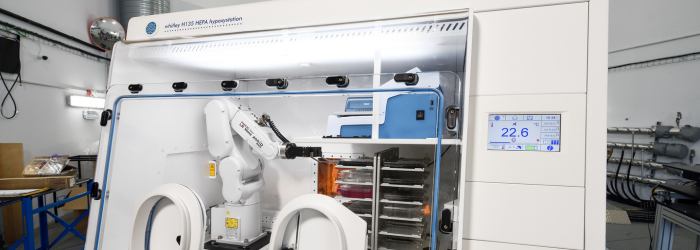
To acknowledge World Cancer Research Day 2024, we wanted to shine a spotlight on the Proton Beam Therapy (PBT) Centre at The Christie NHS Foundation trust, Manchester.
We are once again working with the team in Manchester and thought this was a perfect opportunity to get an update on their important research. Keep reading to hear what Dr Michael Taylor, Senior Lecturer in Proton Therapy Physics at The University of Manchester, had to say.
"A few years ago, we contacted Don Whitley Scientific (DWS) to develop a custom made Whitley H135 Hypoxystation. This workstation is the first of its kind to be used for proton radiobiology research. A lot of specifications needed to be met so we had to work very closely with DWS. They took the feedback and design requirements on board and went above and beyond to ensure that the supplied workstation exceeded our expectations. In 2021, the workstation was installed in our dedicated research room in the PBT Centre at the Christie NHS Foundation trust.
PBT is an advanced form of radiotherapy using a high energy beam of protons, rather than high energy x-rays, to deliver radiotherapy. PBT directs the radiation treatment to precisely where it is needed with less damage to surrounding tissue. Hypoxia is known to cause radioresistance through several molecular pathways. Our aim is to study the response of hypoxic cells to proton radiation compared to photon radiation. This will also help us improve our understanding for the mechanisms of hypoxic radioresistance and identify potential therapeutic strategies. Moreover, we are investigating the impact of ultra-high dose radiation, known as FLASH radiotherapy, on cancer and normal tissue. FLASH delivers ultra-high dose rate radiation in a fraction of a second. It has been shown to cause remarkable reductions in normal tissue damage without compromising the tumour kill. Our aim is to explore the hypothesis that proton FLASH depletes the local oxygen concentration inducing hypoxia and normal tissue sparing while still maintaining tumour control.
Our DWS workstation will allow us to set up the ideal conditions for our experiments to study our aims and hypotheses. We can perform proton irradiations under varying oxygen concentrations (21% O2 – 0.1% O2) at 37oC and 5% CO2. Within the workstation, there is a racking system, which we pre-load with up to 36 samples contained in multi-well plates and/or tissue culture flasks. The workstation incorporates a precision, multi-axis industrial robot so that samples can be taken from the racking system, presented to the beam, and then returned to the rack. This arrangement automates the testing process so that the largest possible number of experiments can be performed, under repeatable conditions and in the shortest possible time, without human intervention.
Recently we have collaborated with DWS again to further enhance the capabilities of our workstation, with the addition of another H135 with an attached chiller. This will allow us to irradiate samples at single figure temperatures, slowing down all the chemical processes happening in cells and giving us the chance to look at how the cells respond in the early timepoints just after radiation damage. To facilitate this, the expanded space will also be used to house a microscope in the workstation which the robotic arm can interact with, allowing us to start imaging the samples straight after delivering the proton beam to them. This capability will be unique, with many other PBT research facilities requiring significant delays between irradiation and imaging. The additional space will be flexible such that if imaging is not needed we could instead mount additional racking systems to double our throughput for experiments where an even larger number of repeats would be beneficial."
A massive thank you to Dr Michael Taylor for supplying us with an update into the important research being conducted in Manchester. For an in-depth look at PBT at The Christie NHS Foundation trust, Manchester and to explore their specific setup, click the button below and search our free database for the following paper, or look at our range of Hypoxystations below.


 en
en


 xEnglish
xEnglish